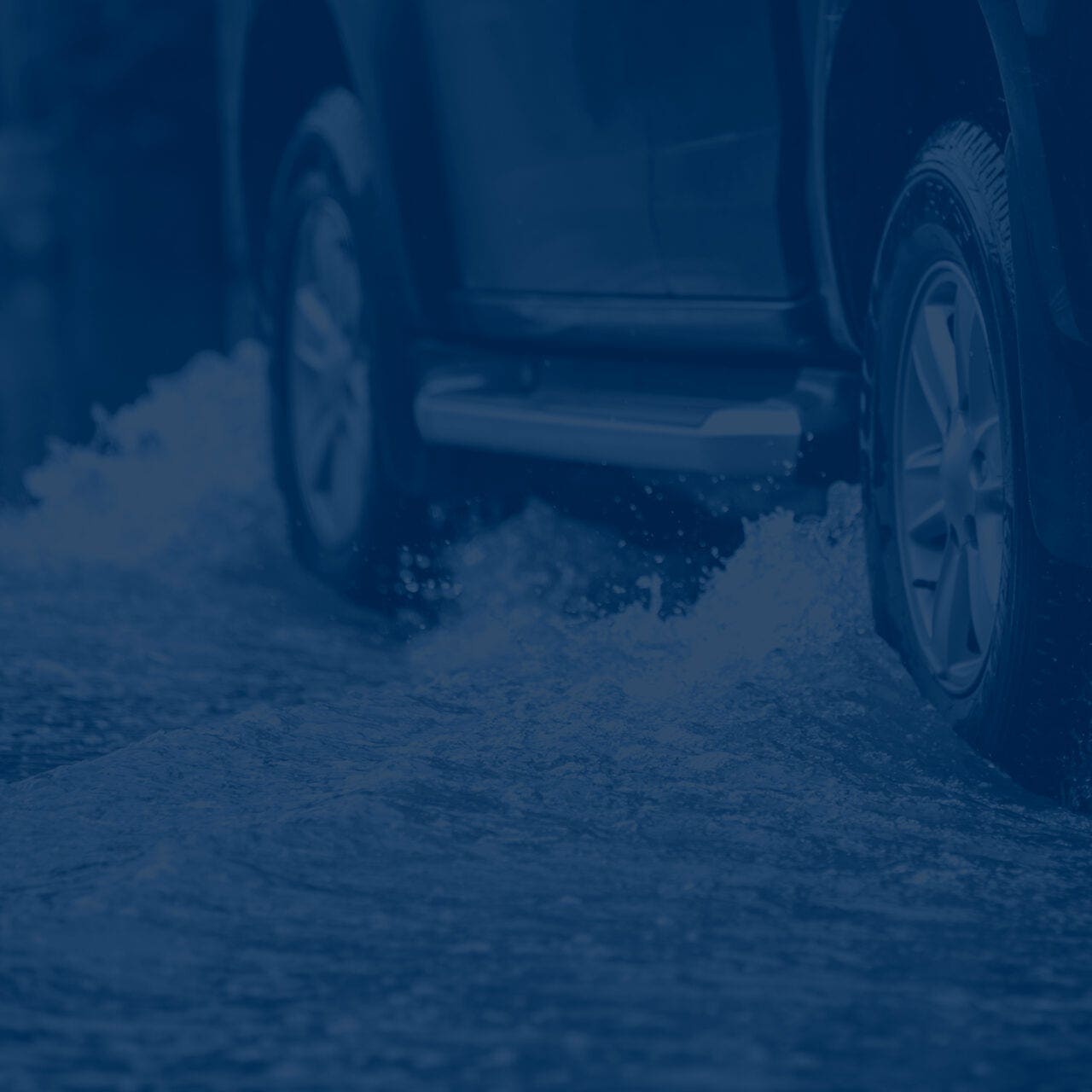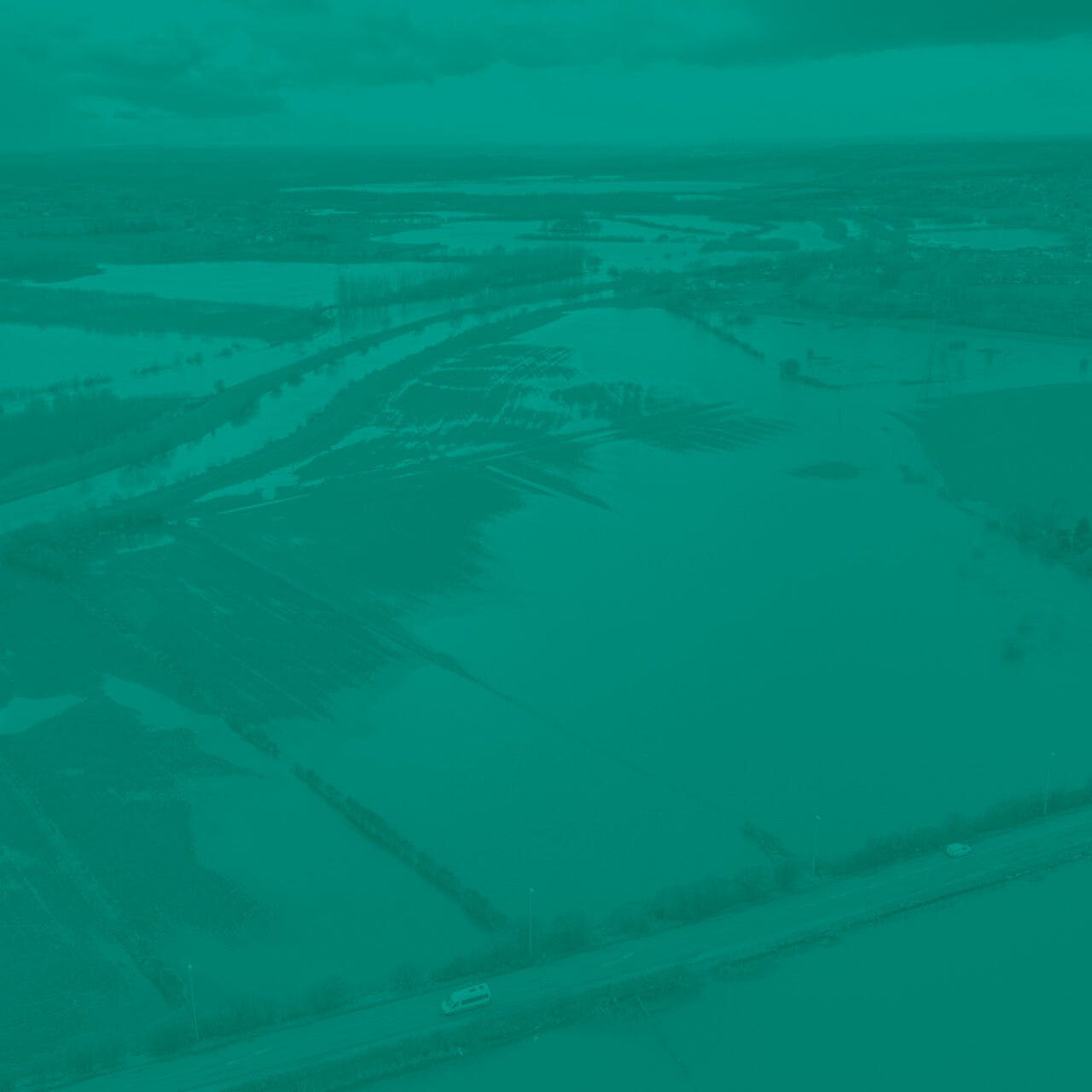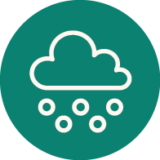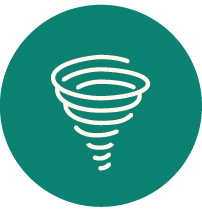
Flood preparedness guide: How to minimize and protect yourself from flood-related water damage
Flood season in Canada typically occurs between the early spring and early summer.
Rapidly melting snowpacks, heavy rainfall and blockages caused by ice jams can cause:
- Localized flooding, which is when overloaded or blocked stormwater drainage systems cannot keep up. This causes water to pool in the streets, yards and other low-lying areas.
- Overland flooding, which is when lakes, rivers and other bodies of water overflow their banks.
- Groundwater flooding, which is when the underground water table rises due to heavy rainfall accumulation. This causes water to enter buildings through cracks in the foundation and other seepage points.
These flood events can result in significant water damage to properties. This includes the flooding of below-ground and first-floor levels, as well as causing sewer backups.
Acera Insurance does more than just provide coverage to protect against a variety of threats — we also aim to empower our clients. We provide the knowledge and tools they need to effectively navigate and minimize potential damage to their home, vehicle, business, farm and livelihoods.
Our flood preparedness guide explains the proactive steps you can take to protect your home, business, or farm from flood-related water damage. It also breaks down the types of insurance coverages available and outlines what to do if you need to file a flood-related claim.
Contents
- Protect your home from floods
- Understanding flood insurance for your home and vehicle
- Protect your business from floods
- Understanding flood insurance for your business
- Protect your farm from floods
- Understanding flood insurance for your farm
- Stay safe during a flood
- How to file a flood insurance claim
- Answers to your frequently asked flood insurance questions
- Additional severe weather resources
Flood information for individuals
Protect your home from floods
You can proactively minimize your risk of flood-related water damage by following these tips:
-
- Keep your gutters, downspouts and roof in good repair and clear of any blockages.
-
- Establish proper drainage by ensuring your downspouts extend at least two metres away from your house. Ensure that the water is draining away from your property.
-
- Cover window wells to prevent water and snow from collecting and then leaking in through basement windows.
-
- Pile snow away from your foundation and windows to prevent the spring melt from seeping into your home.
-
- Improve water absorption by maintaining your lawn (i.e., mowing, raking, aeration, dethatching) and garden. Native plants and vegetation are more effective at soaking up excess moisture and reducing soil erosion.
- Avoid keeping valuable items in your basement; if these items have to be in the basement, pack them in sealable plastic containers that you store higher up on shelving or in cupboards.
- Routinely check the weather stripping on your windows and doors and re-seal when necessary.
- Install backflow valves to prevent sewer backups.
- Install a sump pump with a battery backup.
- Place large appliances, furnaces and hot water heaters on risers so they sit above anticipated flood levels.

Understanding flood insurance for your home and vehicle

While most standard home insurance policies cover some types of water damage, you usually need additional coverages (called endorsements) to be insured for water damage caused by flooding.
Standard home insurance policies typically only provide coverage for water damage caused by the sudden or accidental escape of water from plumbing and appliances.
To protect against flood damage, you will need to add these endorsements to your policy:
Sewer backup provides coverage in the event that water or sewage enters your home from sewer, septic tank or sump pump. Heavy rainfall can cause sewers to overflow, forcing water to back up into a toilet, shower or floor drain.
Overland water provides coverage in the event that your home is damaged by water from a river or lake that has overflowed its banks, as well as from pooling water resulting from a torrential rainfall or rapid snowmelt.
Groundwater provides coverage in the event that the underground water table rises significantly, causing water to seep into your property (most often in a basement or cellar) through cracks in the foundation or by causing septic tank backups.
Even if your condo is above ground level, it’s worth considering extra coverages like sewer backup and overland water. While your unit itself may not sustain direct damage, both localized and overland flooding can cause significant damage to the building and affect you indirectly. Securing the right type of insurance could help cover additional living expenses if you must find alternative, short-term housing if your building is inaccessible following a flood. It can also provide coverage for your portion of the costs to repair damage to the common areas of the building.
Tenant insurance provides coverage for physical damage to your personal belongings in several instances; flooding, however, isn’t one of them. If you rent, you should consider adding endorsements like sewer backup and overland water to your tenant insurance policy. This helps to cover the cost of replacing items damaged during a flood, and to cover additional living expenses if you are temporarily unable to reside in your unit due to flood damage.
Property damage may be the first thing that comes to mind when you think of flooding and insurance.
However, you may have additional coverages that can offer financial protection if severe flooding forces you to leave your home. This could happen if your house falls within a mandatory evacuation zone, or if your condo building has significant water damage and is unsafe to live in for a period of time.
Two common coverages that come into play during severe flooding are:
- Additional living expenses: If you’re forced to leave your property due to flooding (i.e., mandatory evacuation order, extensive property damage, soil erosion resulting in property damage if you live on top of a hill), additional living expenses coverage can help cover your increased costs related to temporary relocation (i.e., hotel, transportation, food).
It’s important to understand that most insurers will determine your coverage amount by calculating the difference between your additional living expenses and your normal living expenses. In the case of flood-related losses, additional living expenses would only be available through either an overland water and/or sewer backup endorsement (depending on the cause of the damage), and not through a standard property policy such as home, condo or tenant insurance. - Food spoilage: This can help reimburse your food costs if the contents in your fridge or freezer spoil due to an accidental power interruption due to flooding.
We recommend that you speak with your Acera Insurance advisor to discuss your coverage limits for both additional living expenses and food spoilage. They’ll work with you to ensure your needs will be adequately covered in the event of a flood-related loss.
Your vehicle may be protected from flood-related damage if you have opted to include comprehensive coverage as part of your auto insurance policy.
Keeping and maintaining a home inventory list (we recommend you update your list at least once a year) can help streamline the claims process should your property sustain flood-related water damage that is covered by your policy. Here are four tips to help you create a home inventory list:
- Walk around your house and document your possessions; you can record these details either in a list or by taking photographs. Try to capture a detailed description of the product, a serial number, the purchase date and estimated value.
- Keep and safely store your receipts. If you’re trying to minimize paper clutter, save your receipts digitally.
- You may want to consider creating 360-degree view videos of both the interior and exterior of your property, as this can help you keep track of your items and any upgrades to your property.
- Store your home inventory in a safe spot — including keeping one copy offsite. Digital copies should be backed up.
What to do if you have questions about flood insurance for your home and vehicle?
If you have questions about whether your home, condo, tenant or auto insurance policy includes coverage for flooding, or if you have additional questions, please contact a member of our team.
Flood information for businesses
Protect your business from floods
It’s a common misconception that expertise in engineering or finance is a prerequisite for effective risk management, when in fact it is a discipline that can be understood by all.
Through education, careful planning and steadfast diligence, you can minimize the risks that floods present to your business.
Depending on if you own, lease or rent your property, and where it is located (i.e., single building, high-rise), may impact who is responsible for the following, but some preventative actions that can be taken to protect the building itself include:
- Filling cracks and framing joints with waterproof sealant.
- Ensuring all windows and doors are properly sealed.
- Having backup systems in place (i.e., portable pumps, alternate power sources).
- Properly waterproofing any external fixtures (i.e., satellites, solar panels, electrical wiring).
- Investing in water barriers such as sandbags and dams.
- Ensuring all exterior drainage is free of blockage and that the roof is in good repair.
Flood mitigation measures you can take for the interior of your business location include:
- Storing merchandise, electronics and other valuables higher up, such as on shelves.
- Storing important documents and files in waterproof containers.
- Placing large appliances and machinery on raised blocks. If this is not possible, consider using barriers such as floodwalls to protect equipment that is stored on the floor.
In addition to minimizing potential property damage, business owners must be prepared to weather the storm that flooding can cause.
This is why creating a business continuity plan is so important; this document can help keep your business operational — or help you bounce back quickly — in the wake of a disaster, such as a flood.
The following list provides guidance to help you get started on creating a business continuity plan, so your business is ready to respond to a flooding event.
Keep your employees safe during a flood
The first step in any disaster, such as a flood, is to protect your employees. These tips can help you react quickly and keep your employees safe in the event of severe weather:
- Identify and proactively inform your employees of evacuation routes and off-site meeting locations.
- Create and share your business protocol for safe evacuations.
- Identify possible risks and hazards to your employees and plan how to minimize the likelihood of injury or illness.
- Develop and regularly review your business’ policies regarding remote work and sick leave.
- Develop a plan for how to operate with a reduced workforce.
- Identify ways to downsize your services in times of disaster, as well as plan for any scenarios that may require providing a boost in your typical operations.
- Proactively coordinate an internal team to serve as the primary communicators during a flood so your employees receive regular, streamlined and accurate communication throughout the duration of the event.
- Understand your responsibilities for working with employees and union(s) to address leave, pay, transportation, childcare, leaves of absences and other human resources issues.
- Ensure your business is prepared to support your employees in managing additional stressors during a flood, such as offering an employee assistance program (EAP).
Maintain business operations during a flood
Being prepared to maintain a certain level of operations during a flood can help you minimize potentially financially devastating business interruptions. Here are some steps to help you get started:
- Complete a risk assessment in which you identify critical operational processes and functions that could be impacted by a flood, including identifying essential employees critical to these processes and functions.
- Determine strategies and develop templated messaging to communicate with your employees, customers, vendors and the like if your business is affected by a flood.
- Remember, your business can be indirectly affected if one of your suppliers is affected by a flood. That’s why part of your business continuity plan should entail a detailed review of your supply chain to determine your vendors’ capabilities to provide your business what it needs during a flood-related disruption. As part of this, your business may also want to consider diversifying its supply chain to minimize potential shortages should a supplier be unable to deliver necessary goods in a time of disaster.
- Regularly train and assess your response team members on their predetermined responsibilities during a flood-related disruption.
Understanding flood insurance for your business
Commercial property insurance can protect your business’ physical assets — such as buildings, inventory, equipment and more — from damage caused by events such as theft, fire and storms; however, protection from flood-related damage will require a specific add-on coverage (called an endorsement).
Endorsements that a business should consider to protect itself from flood-related damage include sewer backup and overland water.
Alternatively, all risk or all perils commercial property damage can provide extended coverage for a broad range of risks, including flood-related damage.
Your business operations could be halted by a flood, even if your property isn’t damaged by water. That’s why your organization should also consider a business interruption policy. Depending on your business interruption policy, the coverage afforded to your business in the event of a flood could include lost profits, operating expenses, temporary relocation costs and more.
There may be other coverages available to protect your business from flooding, depending on your operations, industry, location and more. To learn more about your options, please contact a member of our team.
Assessing your business inventory on a semi-annual or annual basis and maintaining an up-to-date detailed list of your stock, products, contents and/or equipment — including receipts or invoices for these items — can help streamline the claims process in the event of an insured flood loss.
Documenting with photographs or 360-degree videos both inside and outside your business premises can also help you keep track of items and upgrades.
We recommend that you keep a copy of this list and photographs off site, as well as provide them to your Acera Insurance advisor.

Flood information for farms
Protect your farm from floods
Floods can damage farm property; delay, reduce or destroy harvests; interrupt supplies and utilities; and put livestock at risk. Below are some ways to minimize the damage floods may cause to your farm.
You can reduce the impact of flooding on your farm by:
- Building dikes, ditches and irrigation channels to help manage the flow of water.
- Having a parcel of land serve as a dedicated runoff area for excess water.
- Planting trees and other plants, which can help reduce soil erosion, soak up excess moisture and provide an obstacle to water.
- Keeping any existing wetland areas on your property — these are nature’s natural flood mitigation.
- Removing debris and sediment from culverts and watercourses.
Grading the land around structures to ensure water drains away from your buildings.
- Install eavestroughs — which will need to be regularly cleaned to provide a clear path for water — and ensure downspouts drain at least two metres away from your building.
- Install a sump pump, with a battery or generator backup; sewer backup valves; and water alarms.
- Store loose items off the ground.
- Seal your well cap with plastic and duct tape.
- If flooding is imminent, and time permits, sandbag the perimeter of your buildings — particularly around doors and windows — and shut off utilities to those buildings most likely to be affected.
- Store or move electrical equipment, machinery, feed, chemicals, fuel and harvested crops off the ground. If possible, move to a second storey, or use wood or cement blocks as risers to lift these items above anticipated flood levels.
- Securely anchor anything you cannot move and, if possible, enclose these items with a flood barrier (i.e., sandbags, tarps).
- Place important documents and items in sealable plastic bins, which are stored off the ground.
- Have digital backups of all pertinent documents.
In the event of severe flooding, these steps can help you protect the wellbeing of your livestock:
- If you cannot safely move your livestock away from low-lying areas, leave gates open, clear obstacles, and place food and water at the highest possible point to encourage animals to move to a safer location. Another option is to create mounds for animals to stand on in lower-lying areas.
- Close gates and ensure fencing is secure to prevent your livestock from moving to more dangerous areas.
- Ensure you have adequate feed and water available for your animals and/or have a contingency plan in place to get access to these items. Remember to store your feed in higher locations that are less likely to flood. Never feed your animals anything that has been contaminated by flood water.
- Ensure your animals’ vaccinations are up to date as tetanus and diseases are often found after flood events.
- Have visible identification on all animals, if possible.
Understanding flood insurance for your farm
No matter if you have a hobby farm or a large-scale business, you will need overland water coverage to be protected by water damage caused by flooding. In addition to helping to cover repairs or replacements to damaged property, overland water coverage can also help cover additional living expenses should you be evacuated or forced to leave your farm due to flooding.

Stay safe during a flood
- Stay informed on the flood risk by listening to updates from authorities.
- Have your emergency kit ready to go and ensure your vehicle has fuel.
- If you are put under an evacuation alert, consider contacting your electricity or fuel supplier for guidance on how to protect your electrical, natural gas or propane equipment should your property be flooded. Note: Do not shut off your electricity if water is present.
- If possible, move furniture, electrical appliances and other belongings to areas of your property that are above ground level — this can mitigate the extent of damage if your property does flood.
- If possible, move any toxic substances (i.e., pesticides, paint) to areas of your property that are above ground level — this can mitigate pollution if your property does flood.
- Check if your municipality has provided any instructions or resources to protect your property with sandbags or other barriers.
- In the event of an evacuation order, leave immediately via the routes specified by authorities.
- Avoid low-lying areas (i.e., ravines, underpasses) as these can flood quickly.
- Abandon your vehicle should it become stuck in fast-rising water; get yourself and your passengers to higher ground.
How to file a flood insurance claim
Follow these steps if you have experienced property damage or other financial losses (i.e., temporary relocation costs) related to a flood:
- Contact us at your earliest convenience — we’re here to help through the entire claims process.
- Document the damage once it is safe to do so; take photographs and detailed notes.
- Keep all receipts related to cleanup, repairs or replacements, and additional living expenses.
You can find answers to common claims questions here.
Answers to your frequently asked flood insurance questions
Flood-related claims are among the costliest in Canada, causing millions, if not billions, of dollars in insured losses each year.
For example, according to the Insurance Bureau of Canada, notable floods across the country accounted for $210 million in insured losses in 2023 alone, whereas floods in southern Alberta and the Greater Toronto Area in 2013 resulted in nearly $4 billion in insured losses.
Personal, commercial and farm property insurance policies typically only provide protection against water damage caused by the sudden and accidental escape of water from appliances or pipes (such as a burst hot water tank).
To protect your property from flood-related property damage, you’ll need to add additional coverages, such as overland water, sewer backup and groundwater.
The protection that overland water insurance offers is not limited to property damage caused when a river or lake overflows its banks. It also provides protection should your home, business or farm be damaged by the rapid accumulation of rainwater or snowmelt.
The sudden accumulation of rainwater or snowmelt can also overwhelm and cause a sewer system to back up into your property, causing damage. This is why it’s recommended you also consider adding a sewer backup endorsement to your property insurance policy.
Lastly, the sudden or prolonged accumulation of rainwater or snowmelt can cause the underground water table to rise, resulting in water seeping into and damaging your property. This is why it’s recommended you also consider adding a groundwater endorsement to your property insurance policy.
Unfortunately, no. Many insurers do not provide overland water coverage for homes or businesses in areas highly prone to flooding — particularly where flooding is likely to be caused by overflowing bodies of water like lakes and rivers.
No, overland water coverage does not protect against water damage caused by sea water or tsunamis.
Additional severe weather resources

Wildfire preparedness guide
Learn how to insure your home and business against wildfires and how to minimize damage caused by these blazes.

Hail preparedness guide
Learn how to insure your home and business against hail and how to minimize damage caused by these storms.

Earthquake preparedness guide
Earthquakes are unpredictable and can cause significant damage to homes, vehicles, businesses and farms in a short period of time. While some parts of Canada are more prone to earthquakes, a tremor can strike anywhere. These tips can help you be prepared.

Tornado preparedness guide
Tornadoes can form quickly, resulting in extreme winds and thrown debris that can cause extensive damage to homes, vehicles, businesses and farms in a short period of time. While parts of Canada are more prone to tornadoes, a twister can touch down anywhere. These tips can help you be prepared.

Hurricane preparedness guide
Learn how to insure your home, business or farm against hurricanes and how to minimize damage caused by these storms.
